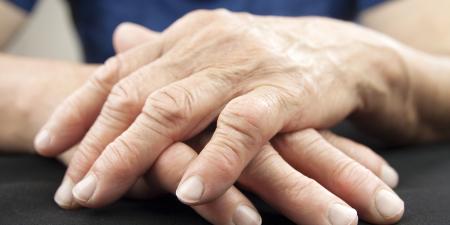Case
Dr. Burke entered the exam room. “Good morning, Jim,” she said cheerfully. “I hear you’re having some trouble with that elbow of yours.”
Jim was one of her favorite patients. When Dr. Burke first moved to this small town in Wyoming, she had been nervous about taking over from a physician who had been working in the community for decades. Although Jim wasn’t one to mince words, he had never questioned whether she was experienced enough to be managing such a large practice on her own.
“You got that right,” he said. “Can barely move it. Never had any trouble with this one, either. It’s usually my hip that acts up this time of year.”
Dr. Burke examined the joint. It was swollen, stiff, and warm to the touch. Jim had a history of osteoarthritis complicated by the fact that much of his work—he was a farmer—required him to be active. He never complained and usually carried on with his work regardless of how he was feeling.
“Well,” she said, “I think we’ll need to aspirate some of the fluid from your elbow to make sure this isn’t from an infection. If it’s your osteoarthritis acting up, we can deal with that pretty easily, but if you’ve got an infection in the joint we’ll need to have some more aggressive treatment.”
“Whatever you say, doc,” Jim said. “You’re the boss.”
Dr. Burke hesitated. She had done a couple of aspirations before, but in her family practice residency most similar cases had been referred to a rheumatologist. She wasn’t entirely certain she had the expertise for a procedure like this, and, should complications arise, there were no other physicians around for miles.
“I’m a little reluctant to do this here in the office,” she said. “I think you’d be better cared for if a specialist handled this one.”
“Well now, I don’t know about that,” Jim said. “I don’t know if I can get away for that long. My wife would have to drive me—she’d miss work. I don’t want to inconvenience her. It’s just a swollen elbow, after all. Are you sure you can’t take care of it here?”
Commentary
Rural health care ethics is becoming the subject of a growing body of literature [1-4]. This case is a classic example of a rural health care ethics situation; the rural context significantly influences the presentation of the ethical conflict, as well as the response [2]. Many of the characteristics of a rural community—limited access to specialists (including ethics consultants), professional and geographical isolation, local perceptions and expectations surrounding health, and overlapping personal and patient relationships [3, 4]—contribute to the case’s complexity. In many rural settings, family physicians tend to be the only doctors in a large area, with few specialists nearby to handle referrals. Dr. Burke practices in a small town, and when patients need hospitalization, they are probably cared for in a critical access hospital (CAH) with 25 beds or fewer. A recent national study noted that only 60 percent of CAHs have formally established ethics committees and ethics consultation services [5], so Dr. Burke may well lack a consult option nearby.
Dr. Burke is most likely an integrated member of a community where “everyone” knows each other. She probably encounters her patients regularly at community gathering places, such as church, the grocery store, and the post office. Dr. Burke undoubtedly provides care for neighbors, friends, and at times, family members. In close-knit settings, overlapping personal and professional environments can foster a high level of trust between patient and physician.
Another common characteristic of rural health care is reflected in Jim’s perception of his elbow problem. Patients’ ideas about health and illness are influenced by their cultural perspective. Many rural residents, particularly those whose livelihoods depend upon physical labor, seek health care only when they are unable to work [6]. Jim expresses reluctance to see the distant specialist because of the time required and the inconvenience driving him will cause his wife. He also wonders if his condition is really serious enough to justify a lost day of work. Should Dr. Burke perform the procedure despite limited experience? Or should she refer Jim to a specialist?
Ability to perform the wide range of procedures called for in underserved settings is an additional clinical challenge that rural providers face. While the majority of primary care doctors would be comfortable with the relatively straightforward procedure called for in this case, not all would be. While Dr. Burke has done “a couple aspirations” before, she clearly does not feel at ease. There may be other considerations at play in her discomfort; we learn early on that Jim is one of her “favorite patients.” Physicians who have social or personal relationships with their patients will occasionally struggle with fears about patient outcomes. What if she proceeds and Jim develops a complication with long-lasting effects? Furthermore, not only is she personally invested in his health, but any poor outcome will most likely become known in a small, close-knit community. While physicians in all settings struggle with the risk of a potential poor outcome, rural settings tend to place providers in daily contact with these potential poor (and excellent) outcomes.
Often, in the rural setting, the proximity or distance of a specialist is the determining factor in whether or not a primary care physician will recommend a referral. This has most likely contributed to Dr. Burke’s limited experience in handling this relatively common procedure. Does the town’s geographic relationship to specialists change the ethical import of Dr. Burke’s decision? No clinician should feel forced to perform a procedure that he or she feels uncomfortable with. But every practicing physician realizes that a considerable portion of the residency training experience was spent working at the edge of his or her comfort zone. Resident physicians learn by performing procedures, generally under the watchful eye of an attending physician or senior resident with far more experience and training. Moreover, physicians who choose to practice in rural regions will occasionally be “forced” to deliver care that they have limited experience with, most notably in emergencies when they are the most skilled people available. It is the very nature of rural work that these circumstances will arise, and presumably no physician accepts the responsibility to work in such an environment without recognizing that.
What are Dr. Burke’s ethical responsibilities to her patient under these circumstances? Several options are worth considering. Rural providers know that a phone call to a trusted colleague at the medical center can be very helpful. A description of the case to her consultant rheumatologist may provide her with the reassurance and confidence she needs to proceed or the advice that spurs her to make a strong recommendation to Jim that he see the rheumatologist. Dr. Burke must also consider the potential for a delay in diagnosis. If Jim does indeed have a septic joint, time may be of the essence, and her ability to obtain a small quantity of fluid to confirm or deny that possibility may make a significant difference in his long-term outcome.
If Dr. Burke chooses to proceed, is it her ethical responsibility to inform Jim of her limited experience with this particular procedure? There will be disagreement on this point, and ethicists and physicians may see this from differing points of view. Doctors with extensive experience in rural areas will acknowledge that procedures are often performed, despite limited experience, without informing patients of such limitations. Certainly in emergency care, time may not allow for such disclosure. However, given the circumstances in this case, ethical behavior calls for full disclosure during the shared decision-making process to facilitate an informed decision on Jim’s part. Jim can choose to have Dr. Burke either perform the procedure or help to facilitate an appointment with the rheumatologist. Given that a delayed diagnosis could be dangerous to Jim if he indeed has a septic joint, Dr. Burke has an ethical responsibility to ensure that the specialist is aware of the significance of timeliness in this particular referral.
Once Jim has been cared for, Dr. Burke should prepare for the next time a similar situation occurs. She might review the availability of her network of specialists and choose to identify an ethics resource that she can readily contact should she find herself in a similar situation in the future. A network of supportive colleagues, specialists, and resources is critical to “survival” for all clinicians, particularly those working in isolated environments.
References
- Nelson WA, Greene MA, West A. Rural health care ethics: no longer the forgotten quarter of medical ethics. Camb Q Healthc Ethics. 2010;19(4):510-517.
-
Nelson WA, ed. Handbook for Rural Health Care Ethics: a Practical Guide for Professional. Lebanon, NH: University Press of New England for Dartmouth College Press; 2010.
-
Nelson WA, Schmidek JM. Rural health care ethics. In: Singer PA, Viens AM, eds. The Cambridge Textbook of Bioethics. New York: Cambridge University Press; 2008: 289-298.
- Nelson WA. Health care ethics and rural life: stigma, privacy, boundary conflicts raise concerns. Health Prog. 2010;91(5):50-54.
- Nelson WA, Rosenberg MC, Mackenzie T, Weeks WB. The presence of ethics programs in critical access hospitals. HEC Forum. 2010;22(4):267-274.
- Bushy A. Nursing in rural and frontier areas: issues, challenges and opportunities. Harvard Health Pol Rev. 2006;7(1):17-27.



